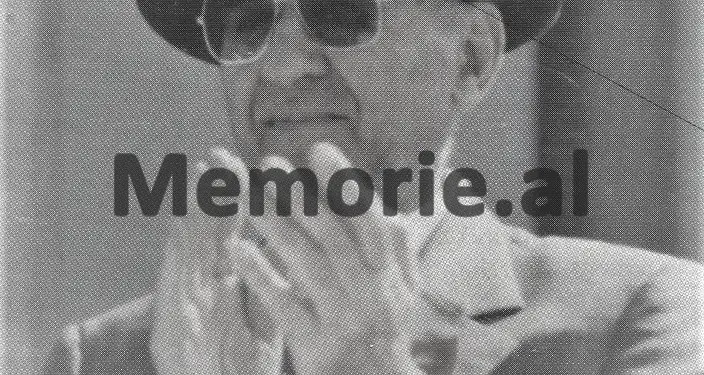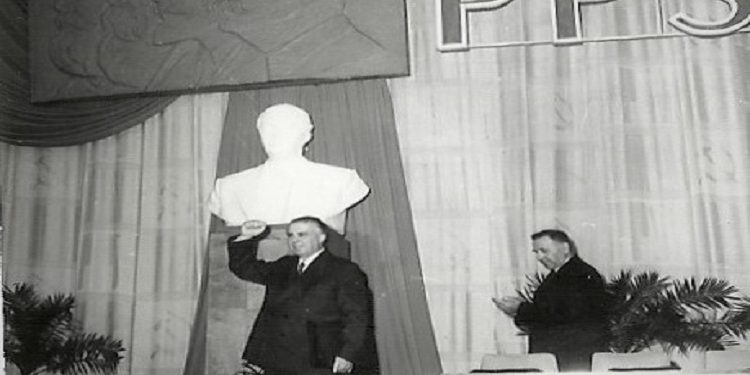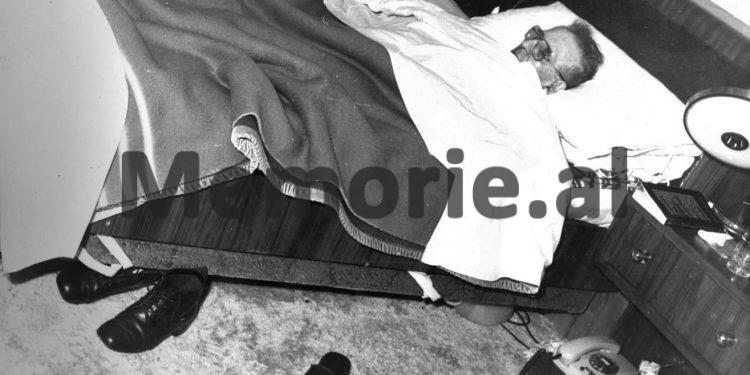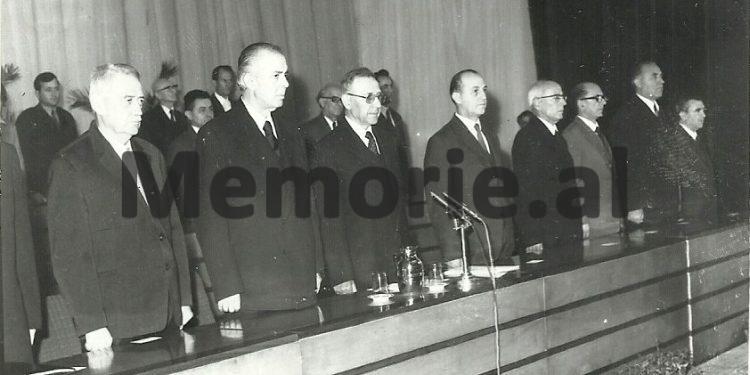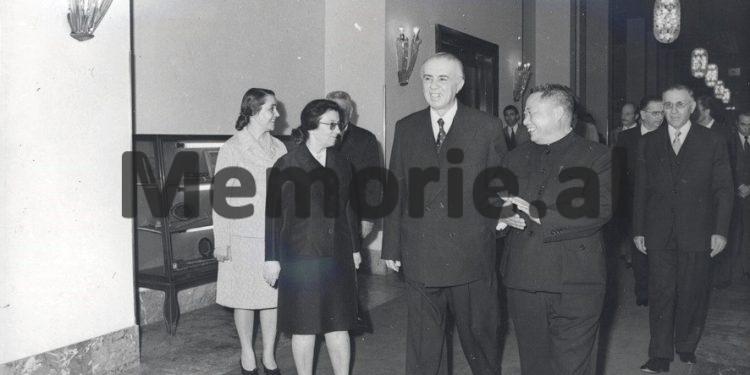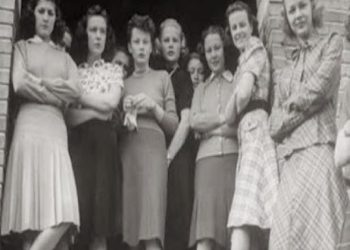Dashnor Kaloçi
Part forty-five
Memorie.al publishes some documents issued by the Central State Archive (fund of the former Central Committee of the ALP), where there is a voluminous file with archival materials which bear the logo ‘Top secret’, which belong to the period of years 1981-1982, with reports, reports, evidence, information, minutes of the meetings of the Politburo and the secretariat of the Central Committee of the ALP, etc., starting from what was held to review and analyze the self-criticism of the former Prime Minister Mehmet Shehu in December 1981, because he had allowed the engagement of his son, Skënder, “with a girl who had some political fugitives in her family circle”, the marathon meeting of the Politburo on the afternoon of December 17 his year that lasted until the late hours of that night, where that problem was discussed with the debates and discussions of all members who “crucified” former Prime Minister Shehu, the meeting of the morning of December 18, after the news that Prime Minister Mehme Shehu had killed himself, the marathon meeting of the Secretariat of the Central Committee of the ALP on September 20, 1982, with the topic: “Analysis of serious mistakes of Kadri Hazbiu, committed during the period when he was deputy minister and minister of Internal Affairs “, where Enver Hoxha initially launched accusations against Kadri Hazbiu, luring him as a” loyalist of the Party “, (in order for him to” open the heart of the Party “, speaking against former Prime Minister Mehmet Shehu) , where at the beginning of his speech, Enver said: “After the coup in the army, we discovered the traitorous group in economics of Abdyl Këllez, Koço Theodhos and Kiço Ngjela with friends. We also discovered this group here; it was not discovered by the State Security. The same can be said about the discovery of the group of Fadil Paçrami, Todi Lubonja and a number of other people connected with them, such as Ismail Kadareja with friends, the Security did not reveal, but that hostile work was discovered by the Committee Central, etc. ”! All these and other documents with the logo ‘Top secret’, will be published in several issues in a row, exclusively by Memorie.al.
Continued from the previous issue
Archival document ‘Top secret’ with the minutes of the meeting of the Politburo dated December 18, 1981, which took place without the presence of Prime Minister Mehmet Shehu, after a few hours ago, he was found dead in his room sleep!
ALBANIAN LABOR PARTY
CENTRAL SECRETARY COMMITTEE
-General Sector-
PROCESS – VERBAL
OF THE MEETING OF THE POLITICAL BUREAU OF THE CENTRAL AFFAIRS OF THE ALP DATES
17 E 18 DECEMBER 1981
FIFTH SESSION
COMRADE ENVER HOXHA: We, in our family, knew nothing about Qazim Turdiu except that he was a professor of mathematics, and we did not know his family circle, both his and his wife’s, at all. We went with Nexhmija to Mehmeti, to wish her more for the new house. There we found Skënder’s children and fiancée (whom Mehmet himself had known the day before), congratulated them, and took pictures. Mehmeti and Fiqret were very happy and that was their right.
But how did they not worry a little in their conscience, that they were mixing and introducing comrade Enver in this filthy dance? They thought that with this presentation this work was sealed, the approval of Comrade Enver was obtained. The photos that were taken with me, went to Qazim Turdiu, they even went to Athens, with the girl’s team and, from there, why not go to Arshi Pipë in the United States of America, who would look like that with whom was the granddaughter engaged and, for this fact, was the photo certificate sent to her?
However, for the interests of the Party and Mehmet himself, I advised this to reflect deeply to discover the causes of the mistake he made. As much as I could, I helped him, to help, in the first place, the Party from a danger that was running (from disruption), not that this Party would not be able to overcome even in the worst case. And lo and behold, what happened is the worst case, this enemy killed himself to save himself and harm the Party.
However, the Party and the people would go through a trauma. And when? Just before the 8th Party Congress. His hostility did not avert this trauma. Our enemies, both internal and external, could benefit from this event. This was avoided, but it was a wake-up call for the Party.
I want to tell you that I completely agree with all your discussions, as well as with the settings you made on Mehmet’s character and work, so the thoughts I have about this enemy, which I am reading to you, are the same as yours. But even what he said, he has dressed with many theories and justifications, with circumstances and factors, with elements that appear “in special cases”, that the mistake I made is not a general characteristic of me … it is only a case”, etc.
These are all sayings of Mehmet. In self-criticism, Mehmeti theorizes, revolves around some negative phenomena of his character, promises that he will make a radical turn, but why-the truth from which this error flowed, are either not mentioned at all, or they are approached superficially, or laid out crookedly.
In self-criticism, Mehmeti expresses an uncontrollable opinion, according to which: “later I would be able to see for myself that I was wrong and, also, I would correct the mistake myself, even without anyone notifying me”. This view also shows that he overestimates himself, even when he makes mistakes. He forgets that a political mistake has many consequences.
And who pays for the broken pots? Undoubtedly, the Party. The help of the Party, at any time and in any circumstance, is very necessary and indispensable. The help of friends should not be underestimated, because, like the help of the Party, the help of friends give strength and clarity not to make mistakes and, when you make mistakes, to correct them.
I have made many remarks to Mehmet, about some bad aspects of his character, such as kidnapping, harshness in relations with friends and some other weaknesses, which he mentions in self-criticism and pointed out to you in your discussions. Even for the last mistake I talked to him at length without gloves, but this mistake has made it absolutely necessary to put the dots on the “i” well.
However, for what he did, again we are acting tactfully against him, raising this issue only in the Politburo and not in the Plenum of the Central Committee and the Party that we do not want to shake the trust of the Party leadership in Mehmeti. He killed himself, because he would have heard my words, he did not have the courage to listen to them, even though he was bravely removed.
The act he did does not speak of bravery in him. But we also went with the hope that this necessarily, should make a radical turn in many aspects of his character, in some aspects of the method of work and especially in relations with comrades, whether these cadres of leadership or other levels, in the Party and in the state.
One of the main sources of this error and his other errors, which have prevented him from correcting his character, is the arrogance that Mehmeti has put at the bottom of the list and presented with theoretical contours and excuses, quoting Lenin, for what he called: “communist arrogance.”
And this kind of “arrogance, says Mehmeti, appears in certain cases, as it appeared in the boy’s engagement.” Again “accidentally”, again “only” for the boy’s engagement. If that were the case, then he could very well have said, “Why are you making this so big?”
In the life of the Party, Comrade Mehmet has made many mistakes, even serious ones. You young people do not know this, but you will learn it. What are these? In short, it is our duty, on this occasion, to mention a few:
Mehmet does not fail to point out the value of his war, which no one denies and no one should deny. But his attitudes and actions during the war have both weaknesses and mistakes.
Mehmeti, in some of his letters and in the positions we know, was not so clear about the Party’s line for the National Liberation Front. He expressed contempt and wrote a letter to Dusan Mugosha, criticizing the General Staff, calling the “officers” officers, communists or not, those whom the Party had approached and given units to direct.
This does not mean that the communist has no right to make remarks, but that letter shows Mehmet’s megalomania and careerism. The political orientation of the Party and the interest of the National Liberation War in the use of the capacities and influence of these people are important, which at that time and for that time were neither nullity nor against the Party line.
For the liberation of Tirana, on each anniversary, only the role of comrade Mehmet is noted. He was the commander of the forces and the Operational Staff that were assigned for the liberation of Tirana, but it is known that the plan for the liberation of the Capital was elaborated by the General Staff (these documents are forgotten), was also elaborated by the First Corps, where Commissar Hysniu was .
Neither the role of Hysni, who was in charge of directing and coordinating military operations for the liberation of Tirana, nor the contribution of Gogo, as the leader of the Party organization for Tirana and the delegate of the Central Committee, are mentioned at all. Why this monopoly? This is mainly the fault of propaganda comrades, the press and those who write articles and give interviews. Why should I intervene for these things? Mehmet himself could and should put things in their place, as a communist and a leader he is.
Mehmeti and other comrades were volunteers in the Spanish War. This is a merit for all of them, but it is not right for only Mehmet’s merits to be raised, while for others, who have fought like him, who have also had higher responsibilities, (that Mehmet has been only a simple volunteer and managed to become a platoon commander and not a battalion commander, as he put it) there is almost no talk at all.
Understandably, it was not Mehmet who prevented anyone from talking about them, but the flatterers and opportunists themselves are concerned about this matter. When you are in power, such guys praise you, while when your foot slips, they throw the stone. The Spanish war has its good sides, but it also has the shortcomings of its “armor”, such as anarchism, terrorism, voluntarism, etc. I am therefore mentioning this issue that it is possible that these dangerous influences have inadvertently left an impression on Mehmeti and are considered as a merit covered by the shadow of the Spanish War.
The cult of the person is punishable, not only when it is exaggerated with cheers, slogans, songs, etc., but it appears, even becomes very dangerous even when a leader, despite not being praised for it, seeks to impose himself with orders, with arrogance, arrogantly, when he has established the belief that such attitudes, such actions are right are normal and that, unlike other comrades, he may and should be allowed these, however they may be, even when they are not right.
Herein lays the cult of the person again. I have emphasized hundreds of times that in the Party there are no privileges that in the Party the cult of the person must be fought, that in the Party conformism must not be allowed, but that the conscious Marxist-Leninist communist conviction must prevail through open, frank discussions, without any thread of shyness from anyone.
At the last meeting of the Politburo, I raised the need for an in-depth analysis to correct the working method of the Government and its presidency, taking even some organizational measures for the presidency of the Council of Ministers and for a fairer determination of the division of the work and functions of the members of the presidency, not allowing this to be placed on the Government.
The last few days I had a long conversation with my friend Adil and Mehmet about this problem. For three hours we talked and discussed together as brothers, socially, in a very open and warm spirit, and even jokes were made to both friends. Adil was convinced that this is right and this is how it should be done, this is how I convinced Mehmet.
(But the suicide showed that he was not convinced of anything.)
We need to define more clearly the competencies of ministers, as individuals, which need to be much broader. Their responsibility should be much greater for the departments or sectors they lead and as members of the Government, as a high collegial state body.
We must all be fully mobilized and more than ever at work, to respond to all this revolutionary impulse that has erupted in the working class, in the cooperative peasantry, in all the employees of the scientific, educational and cultural sectors of our country for implement, with the Communists at the forefront, the historic decisions of the 8th Party Congress and realize the new plans of the seventh five-year-old.
I want to express the conviction that, like all of us, Mehmeti will be in charge of the work assigned to him by the Party. Mehmeti did not have patience, he killed himself and did not listen to my discussion, which joins and is in line with the remarks of his friends, and Mehmeti had lost faith in the Party. Memorie.al
The next issue follows



